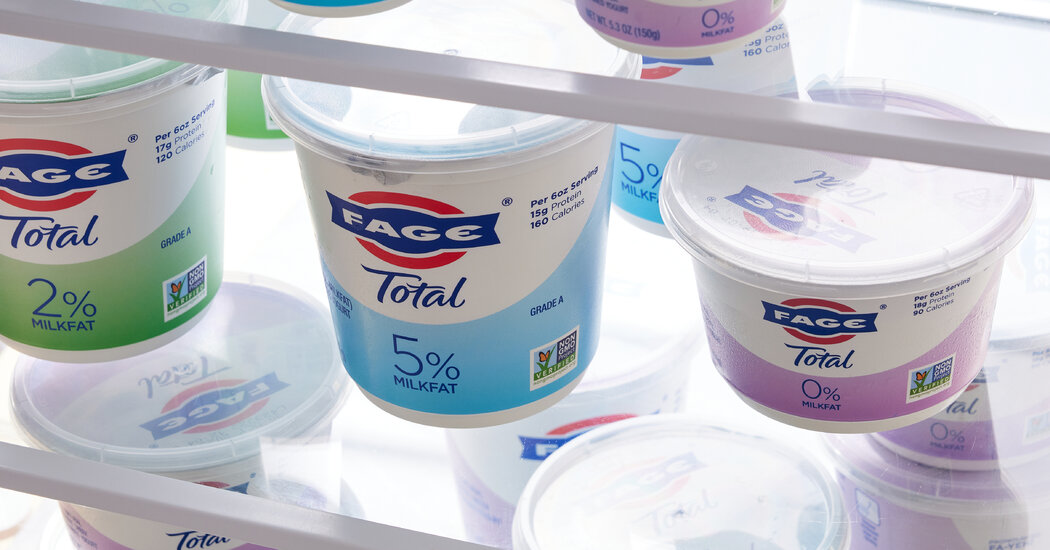Nonfat or full-fat, flavored or plain, probiotic or natural — yogurt is already peppered with labels. But you may soon see a new claim on your container: This month, the Food and Drug Administration announced it will allow yogurt makers to say their products may prevent Type 2 diabetes.
The F.D.A. said it has found “limited scientific evidence” that consuming yogurt may reduce the risk of Type 2 diabetes. The agency’s decision came in response to a petition submitted on behalf of Danone North America, which makes yogurts sold under brands including Activia, Dannon and Oikos.
Yogurt can be a nutrient-rich food and part of a healthy diet, and there is some evidence to suggest that people who eat it regularly have a lower risk of Type 2 diabetes, said Dr. Frank Hu, a professor of nutrition and epidemiology at the Harvard T.H. Chan School of Public Health.
But consumers may not realize that “limited evidence” means “the evidence isn’t very strong,” said Bonnie Liebman, the director of nutrition for the Center for Science in the Public Interest, which submitted a public comment opposing the petition. Here’s what the science says.
What is the evidence on yogurt and Type 2 diabetes risk?
The F.D.A. cited 28 studies in its review of the evidence on yogurt and risk of Type 2 diabetes. Overall, the evidence is somewhat limited and inconsistent, said Dr. Hu: Some studies found that people who consumed more yogurt were less likely to develop diabetes, but others did not.
Dr. Hu and his colleagues conducted several of the largest studies cited by the F.D.A. In a 2014 paper, for example, they looked at three large groups of adults in the United States, totaling nearly 200,000 people. They found that those who consumed two servings or more of yogurt per week had a 12 percent lower risk of Type 2 diabetes compared to those who rarely ate yogurt.
But a 2019 study of 7,633 women in Australia, as well as several others mentioned in the F.D.A.’s review, did not find a significant link between eating yogurt and preventing Type 2 diabetes.
All of the studies cited by the F.D.A. were observational, meaning that researchers primarily asked participants how much yogurt they consumed and then tracked whether or not they developed diabetes over time. Such studies can’t determine if yogurt directly prevents Type 2 diabetes, since people who eat yogurt may also have other healthy habits that could protect them from the disease, Ms. Liebman said. Researchers try to account for these other factors using statistical methods, Dr. Hu said, but he agreed that they could play a role in the lower risk seen among yogurt eaters.
According to the F.D.A., the label should specify that “eating yogurt regularly, at least 2 cups (3 servings) per week may reduce the risk of Type 2 diabetes.” That weekly amount was the minimum needed to see a benefit in two studies that the agency reviewed.
Despite the uncertainties, it is plausible that consuming yogurt could contribute to a lower risk of Type 2 diabetes, Dr. Hu said. It’s rich in protein, minerals and vitamins, and unlike most other dairy products, he added, yogurt usually contains a significant amount of live bacteria which could reduce inflammation and insulin resistance.
The new health claim could serve as a useful reminder to people that yogurt can be a healthy choice, said Dr. Meera Shah, an endocrinologist at the Mayo Clinic in Rochester, Minn.
But, she added, eating three servings of yogurt a week is not likely to prevent Type 2 diabetes on its own. “It’s much more than that,” she added.
What other foods can reduce your risk of Type 2 diabetes?
Maintaining a healthy weight and following an overall balanced diet are both important for preventing Type 2 diabetes, Dr. Hu said.
There’s solid evidence that following the Mediterranean diet can prevent Type 2 diabetes. You can adapt the diet to your own preferences, Dr. Shah said, by building your meals around its main components — whole grains, fruits and vegetables, legumes, nuts and seeds and healthy sources of fats such as olive oil and fish.
Drinking coffee has also been linked to a lower risk of Type 2 diabetes, Dr. Hu added.
Just as important, he said, is limiting your consumption of foods that can increase your risk of developing Type 2 diabetes, including sugary beverages, processed meats, and ultraprocessed foods.
Several servings of yogurt per week — particularly plain yogurt without added sugars, perhaps sweetened with fresh fruit or a drizzle of honey — can certainly be part of an overall healthy diet, Dr. Hu said.
But, he added, “it’s not a magic bullet.”







